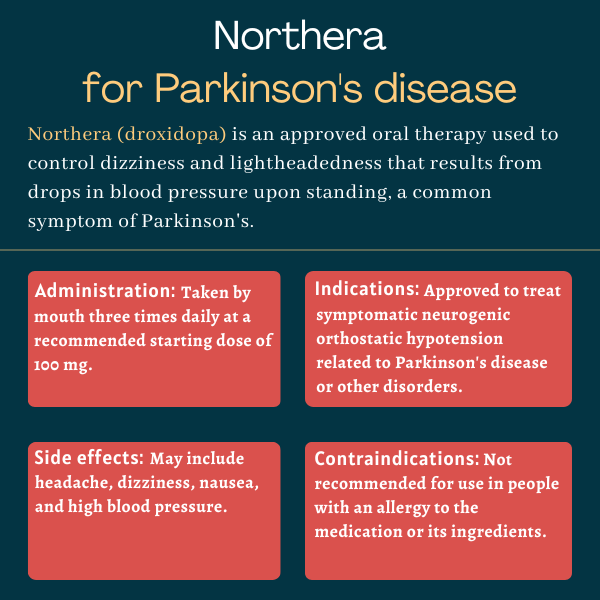 Discussion
Discussion
Northera (droxidopa) for Parkinson’s disease
Last updated March 15, 2024, by Marisa Wexler, MS

What is Northera for Parkinson’s disease?
Northera (droxidopa) is an oral therapy approved in the U.S. to control lightheadedness or dizziness related to neurogenic orthostatic hypertension — a common nonmotor symptom of Parkinson’s disease where a person’s blood pressure drops when they rise from a seated or lying position.
Name-brand Northera is sold by Lundbeck. Several generic versions of the medication also are available.
Therapy snapshot
| Brand name: | Northera |
| Chemical name: | Droxidopa |
| Usage: | Used to manage dizziness, lightheadedness, or the “feeling that you are about to black out” in adults with neurogenic orthostatic hypotension related to Parkinson’s or other disorders |
| Administration: | Oral capsules |
How does Northera work?
Neurogenic orthostatic hypotension is a condition where blood pressure drops significantly when a person stands up, leading to symptoms like dizziness, lightheadedness, and fainting.
Exactly how Northera helps to control orthostatic hypotension isn’t known. Once inside the body, the therapy is metabolized to produce a signaling molecule called norepinephrine that is known to increase blood pressure by prompting the tightening of blood vessels. It’s thought that Northera acts mainly by increasing norepinephrine signaling.
Northera essentially boosts the levels of norepinephrine in the body, helping to counteract the drop in blood pressure that occurs when someone with neurogenic orthostatic hypotension stands up. This can reduce symptoms and improve the person’s ability to maintain an upright posture without feeling dizzy or fainting.
Who can take Northera?
Northera gained accelerated approval by the U.S. Food and Drug Administration in February 2014 for symptomatic neurogenic orthostatic hypotension in adults, marking the first approval of a therapy for this symptom.
It is indicated for dizziness, lightheadedness, or the “feeling that you are about to black out” in people with Parkinson’s or other neurological disorders that can cause a drop in blood pressure upon rising from a seated or lying position.
The medication is not approved in the European Union.
Who should not take Northera?
Northera is contraindicated, or should not be used, by anyone with a history of allergic reactions to the medication or any of its ingredients.
The therapy’s prescribing information also contains a boxed warning about the risk of supine hypertension, or when a person’s blood pressure becomes elevated when lying down, during treatment. Supine blood pressure should be monitored before and during treatment, especially when increasing doses.
Raising the head of a patient’s bed can lower the risk of supine high blood pressure, and it’s recommended that blood pressure be measured in this position. If supine high blood pressure cannot be controlled this way, patients may need to decrease or stop treatment with Northera.
How is Northera administered in Parkinson’s?
Northera is available as hard gelatin oral capsules that come in three dosage strengths:
- 100 mg capsules, with a light blue cap and a white body, printed with “Northera” on the body and “100” on the cap
- 200 mg capsules, with a light yellow cap and a white body, printed with “Northera” on the body and “200” on the cap
- 300 mg capsules, with a light green cap and a white body, printed with “Northera” on the body and “300” on the cap.
The medication is taken three times daily: upon waking up in the morning, at midday, and in the late afternoon. It may be taken with or without food, but always the same way each time.
To reduce the risk of high blood pressure while sleeping, the afternoon dose should be taken at least three hours before bedtime, and the head of the patient’s bed should be elevated.
The recommended starting dose is 100 mg three times per day. This may be increased every day or two, up to a maximum dosage of 600 mg three times daily.
If a dose of Northera is missed, the next dose should be taken at the regularly scheduled time and should not be doubled.
Dose adjustments may be required in patients who are taking DOPA decarboxylase inhibitors, such as carbidopa and benserazide, which are often taken with levodopa. Additionally, when being treated with Northera, the use of nonselective MAO inhibitors and linezolid (an antibiotic) should be avoided due to the potential for increased blood pressure.
Taking Northera with other medications, such as over-the-counter medicines, vitamins, or herbal supplements, may also cause side effects.
Northera’s effectiveness beyond two weeks of treatment is not known. As such, the treatment’s continued effectiveness should be assessed regularly.

Northera in clinical trials
The accelerated approval of Northera in the U.S. was supported mainly by data from two Phase 3 clinical trials, referred to as study 301 (NCT00782340) and study 306B (NCT01176240).
Study 306B
In Study 306B, a total of 147 people with Parkinson’s disease who were experiencing neurogenic orthostatic hypotension were randomly assigned to receive Northera or a placebo, three times daily.
In the first two weeks, patients were allowed to increase their doses from 100 mg to up to 600 mg to reach an optimal treatment benefit. Then, for the next eight weeks, both placebo and Northera were given at the selected dose. Throughout the study, all Parkinson’s treatments could be maintained, and participants could use a bedtime short-acting antihypertensive medicine.
Results showed that, after one week of treatment, participants given Northera reported significantly greater improvement in dizziness and lightheadedness, by 0.9 points on the 11-point Orthostatic Hypotension Questionnaire (OHQ), which is a patient-reported outcome that measures symptoms of neurogenic orthostatic hypotension and their impact on a patient’s ability to perform daily activities that require standing and walking.
Changes in symptoms continued to favor Northera at later time points, but the benefits were not statistically different from the placebo.
Study 301
Study 301 first required all participants to enter a two-week period in which doses of Northera were optimized, and only those who responded to treatment were randomly assigned to receive it at the optimized dose or a placebo for one week after a week without treatment.
A total of 162 people with neurogenic orthostatic hypotension entered the randomized part, including 60 individuals with Parkinson’s disease. The treatment was given three times daily at doses ranging from 100 to 600 mg, and that last daily dose was to be given at least four hours before bedtime.
Results from this trial also showed patients given Northera experienced a more substantial easing of dizziness and lightheadedness than those on a placebo — a difference of 0.7 points on the OHQ scale.
In both studies, researchers observed increases in standing and supine (laying down) systolic blood pressure, indicated by the upper number in a blood pressure reading that measures the force of blood against the walls of the arteries when the heart beats.
Other trials
Similar to Study 301, two other trials — called study 302 (NCT00633880) and study 303 (NCT00738062) — tested Northera in a withdrawal setup, where the therapy was given for a few weeks to attain a stable dose, then participants were randomly assigned to continue on their optimal Northera dose or switch to a placebo.
However, neither of these studies showed a significant difference in dizziness or lightheadedness scores between patients who continued on Northera versus those who switched to the placebo.
These data collectively show Northera can help to ease dizziness and lightheadedness related to neurogenic orthostatic hypotension in the short term. However, whether the therapy offers any meaningful benefit when used for longer than about two weeks is uncertain.
Common side effects of Northera
The most common side effects of Northera include:
- headache
- dizziness
- nausea
- high blood pressure (hypertension).
Supine hypertension
Northera can cause supine hypertension, where a person’s blood pressure becomes elevated when lying down. Raising the head of a patient’s bed, so that their head is higher than the rest of the body when resting or sleeping, can help to lower the risk of supine hypertension.
While patients are on Northera, and especially when the dose is increased, their blood pressure in a supine position should be monitored. If supine hypertension cannot be managed with head elevation, patients should reduce their dose or discontinue treatment, as uncontrolled supine hypertension can increase the risk for heart-related health problems, particularly stroke.
High fever and confusion
There have been reports of patients given Northera experiencing a rare but life-threatening syndrome characterized by fever or hyperthermia, muscle rigidity, involuntary movements, and changes in consciousness and mental state.
Patients should be monitored carefully when the dosage of Northera is changed or if their levodopa treatment is reduced or stopped, especially if they are taking antipsychotic medications.
Heart disease
Northera may worsen underlying heart problems such as heart disease or abnormal heart rhythms, so careful consideration is advised if the medication is used for people with these conditions.
Allergic reactions
Allergic reactions to Northera, including serious reactions called anaphylaxis, have been reported. If an allergic reaction develops, the treatment should be discontinued immediately, and appropriate medical support should be given to manage the reaction.
The therapy also contains FD&C Yellow No. 5 (tartrazine), which can cause allergic reactions in certain people. Allergies to tartrazine are particularly common among people who are allergic to aspirin.
Use in pregnancy and breastfeeding
Northera has not been rigorously studied in people who are pregnant or breastfeeding. In animal studies, treatment with Northera did not cause overt issues for the developing fetus when taken during pregnancy. However, when animals exposed to Northera during pregnancy were subsequently bred, they had notably lower live birth rates.
Northera is not recommended for use while breastfeeding due to a risk of serious complications, including reduced weight gain in the breastfed baby.
Parkinson’s News Today is strictly a news and information website about the disease. It does not provide medical advice, diagnosis, or treatment. This content is not intended to be a substitute for professional medical advice, diagnosis, or treatment. Always seek the advice of your physician or another qualified health provider with any questions you may have regarding a medical condition. Never disregard professional medical advice or delay in seeking it because of something you have read on this website.
Recent Posts
- Being mad at each other and mad at Parkinson’s disease, too
- Parkinson’s muscle firing patterns different for women than for men
- Breathing CO2 activates brain cleanup signals in new Parkinson’s study
- Guest Voice: DBS surgery transformed my life with early-onset Parkinson’s
- Smartphone app helps Parkinson’s patients map daily symptoms
Related articles
-
 Discussion
Discussion
-




